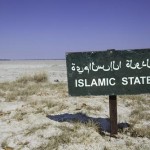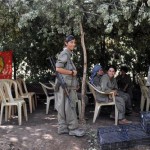As I am still intent on a writing project, it is my pleasure to bring you this guest post by the esteemed scholar, and Franciscan Friar, Elias D. Mallon, who writes to caution Muslim friends that increased Islamic outreach and dialogue is urgently needed, if their credibility is to be preserved in the face extremist factions like ISIS and Boko Haram, and their continued crimes against humanity.
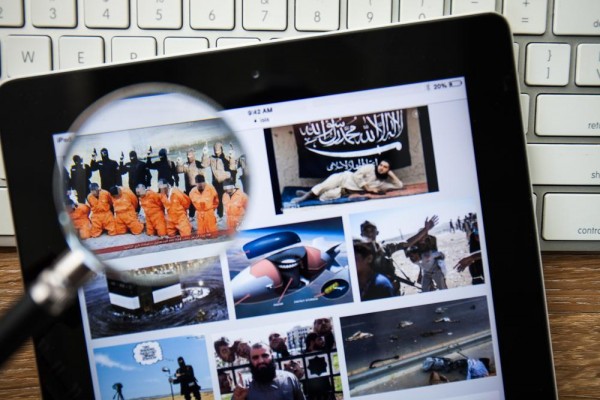
An Examination of Conscience is Not Just for Christians
If these specific things had not been done, would ISIS then be Islamic?
by Elias D. Mallon, S.A., Ph.D
Pope Francis visited Turkey 28-30 November 2014 and paid a state visit to Recep Tayyip Erdoğan, the Prime Minister of Turkey. In their speeches both the pope and prime minister referred to the violence in the region and the necessity for just and peaceful solutions. However, Erdoğan blamed the rise of ISIS on the “serious and rapid rise of Islamophobia” in Europe and the West. Erdoğan’s criticism is not an isolated one but one which is increasingly being heard.
It cannot be doubted that there has been a rise in xenophobia (fear of the foreign) in Europe in the past decades. It is not, however, something which is new. Islamophobia is only one of the forms that this xenophobia takes, although in recent years for a number of reasons Islam has been a favorite target. In France Jean-Marie LePen and the National Front Party (Front national), in Austria Jörg Haider and the Austrian Freedom Party (Freiheits Partei Österreichs), in the Netherlands Geert Wilders and the Freedom Party (Partij voor de Vreijheid) have a long history of opposition to immigration in general in order to protect “European values.” Although Haider was of the opinion that Islam was incompatible with European democracy, Islam was for the most part more a target of opportunity—many immigrants were coming from Turkey and North Africa—than an ideological choice.
Recent events in the Muslim world, the rise of political Islam, jihadism and terrorism have focused much of the contemporary European xenophobia on Islam. On 15 December 2014 in Dresden, Germany, there was a large demonstration denouncing the “islamicization” of Europe. A movement which started originally in Denmark has developed into PEGIDA (Patriotische Europäer gegen die Islamierung des Abendlades, Patriotic Europeans against the Islamicization of the Occident) and seems to be mostly in the eastern half of Germany. Other groups with odd and ominous names such as Hooligans gegen Salafisten, “Hooligans against Salafists” have had the ability to tap into those elements of society which, for one reason or another, feel disenfranchised or “cheated.” Similar groups have emerged in the UK. In almost all cases, immigrants are seen by these people as the cause of society’s problems.
North America is also not free of xenophobia but in the USA it is directed mostly at Hispanics. Nevertheless, there have been protests about the building of mosques and even burnings of mosques in some US states. Muslims are profiled by police and security forces as possible terrorists. There are also credible indications that there is economic and job discrimination against Muslims in some places.
In all of this it must be noted that in each of these countries the government has reacted vigorously against the xenophobic and islamophobic demonstrations. Very often they are equated by these governments with neo-fascism and the extreme right. While these movements have much in common with neo-fascism and the extreme right, however, it is not clear that a simple identification is helpful or accurate.
There is nevertheless no doubt that in Europe, North America and elsewhere Muslims are the objects of discrimination and more or less organized xenophobia. However, the actions of all of the governments involved make it clear that, while we can accurately speak of discrimination, it is simply not true that Muslims are being persecuted in Western Europe or North America.
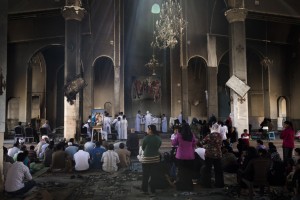
People who have been involved in the Catholic/Christian-Muslim dialogue for decades and who have a high regard and affection for Islam are sensing a tension, if not emerging crisis, in the dialogue recently. To be honest, the statement that “Islam is a religion of peace” is becoming less and less credible.
This is not simply due to prejudices in the west but to the actions of some Muslims themselves. While admittedly the west has played a devastating and regrettable role in destabilizing Iraq, in the past ten years over a million Christians have been killed, plundered or forced into refugee status by Muslim movements in northwestern Iraq alone. ISIS’s ideology to spread the caliphate around the world puts it into a religio-political ideology.
It is the expressed mission of ISIS to spread the caliphate over as much territory as possible. Talk of the black flag of ISIS flying over the White House and other western capitals does nothing to calm xenophobia in Europe and the west.
Even paranoids can have real enemies. Atrocities such as the kidnapping of hundreds of school girls by Boko Haram in Nigeria and the recent slaughter of more than a 120 students in Peshawar, Pakistan, by the Taliban all have one thing in common: their actions are done in the name of Islam and using the Qur’an and the Sunna of the Prophet as justification and support.
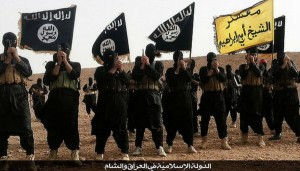
Living religions, be it Christianity, Islam, Hinduism, etc., do not exist primarily in the abstract. While a religion such as Islam or Christianity can be studied as an academic abstraction, religions in fact come alive in the believer. It is how the believers of a religion appropriate it that defines a religion at any given point of time. How sacred texts, times, actions and values are put into practice are what show how a religion exists in the world of our experience.
To be sure, no religion consists only of those who always and everywhere adhere to its highest ideals. However, the manner in which fairly large groups of people put a given religion into practice can tell us something about that religion, at least at a particular point in history.
A religion can be one thing in the ideal and quite something else in practice at a given time. Religions of love like Christianity can and have behaved in hateful ways. Islam can still be a religion of peace and have severe problems in how segments of its faithful are behaving in violent and warlike ways. Recognizing this is something which is painful for any religion’s self-imagine but is absolutely crucial for its integrity and faithfulness.
It is clear that many—indeed most—Muslims do not approve of such behavior and do not interpret the Qur’an in such exclusive and violent ways. Often without recognition from the west, Muslim scholars have done a great deal to counteract the ideology of ISIS. I totally agree with those Muslims who hold that these organizations are acting contrary to the values of Islam.
However, it comes across as morally disingenuous to then absolve oneself simply by declaring that these movements are not Islamic. They are self-identified as Muslim. This is the takfiri movement in reverse. If extremists like ISIS declare other Muslims infidels to be killed as apostates because they disagree with them, simply declaring ISIS to be non-Muslim does not seem to be qualitatively different unless detailed reasons are given. The open “Letter to Dr. Ibrahim Awwad Al-Badri, alias Abu Bakr al-Baghdadi” by over a hundred Sunni scholars comes close, but has not received the coverage it deserves.
At times, nevertheless, some Muslim responses appear half-hearted as if to avoid deeper, more disturbing questions. One sometimes gets the impression that the argument is: because it has done these, specific things, ISIS is not Islamic. One wonders then, if these specific things had not been done, would ISIS then be Islamic?
One of the purposes of dialogue is the pursuit of truth in love. Every group—religious or otherwise—has a self-image. In dialogue that self-image can be examined in ways which are uncomfortable. While it is never justifiable in dialogue to compare the best of my religion with the worst of the other believer’s faith, in the encounter I may also be able to see my religion in a different light, which can be unflattering and even disturbing. An example of this may help Muslims in the crisis which they are experiencing.
The Jewish-Catholic dialogue began in earnest with Vatican II (1962-65). Although there had always been respectful encounters between some Catholics and Jews, it was not until the Decree Nostra Ætate (1964) that Catholics formally and officially began to dialogue with Jews.
One of the dominant topics on the agenda was the Holocaust. The systematic extermination of six million Jews in “Christian” Europe was the chief concern of the Jewish dialogue partners. While the Nazi experience was horrendous in its demonic efficiency, it was not a new phenomenon. Jews had been killed, plundered, persecuted and exiled throughout Europe for well over a thousand years. Facing the Holocaust through Jewish eyes was (and still is) painful for Catholics and other Christians. In the initial shock and shame some began to explain the Holocaust as not being connected to Christianity at all. Nazism, it was argued, was a self-consciously pagan phenomenon, which was true. Those Christians who (often enthusiastically) supported Nazism were taking part in a pagan phenomenon and were, therefore, not really Christians.
It was not long, however, before the moral weakness of the argument became clear. The insistence of Jews that the Holocaust was not an isolated phenomenon but part of a Christian history of well over a thousand years together with the witness of those heroic Christians who gave their lives in opposition to Nazism prodded Christians to deeper reflection.
After a long and often painful dialogue, which is still ongoing, Catholics and Christians in general began to realize that some of the things we did and some of the things we held dear could—and in fact did–have violent and deadly consequences for Jews. For example, the Gospel of John, the most “theological” and “mystical” of the Gospels, spoke of “the Jews” in odd and dangerous ways. One example of an odd citation can be found in John 20:19 where we are told that the disciples were behind locked doors “for fear of the Jews.” Yet the disciples themselves were Jews!
An example of a dangerous citation can be found in John 19:7 where it states “’We have a law,’ the Jews replied ‘and according to that Law he [i.e. Jesus] ought to die, because he has claimed to be the Son of God.’” For two thousand years this verse and others were used to accuse Jews of the crime of deicide, “killing God,” and to justifying punishing them for the crime.
These were not theoretical possibilities but realities which played themselves out with sickening regularity over the centuries. It is difficult for a non-Christian to appreciate how difficult it was—and still is—for many Christians to face these realities. Over the years the Catholic Church and other Christian Churches have recognized the role that our theologies played in the persecution of Jews. Non-scriptural texts which were offensive were dropped and explanations were added to difficult scriptural texts. Churches issued guidelines for preachers on how to deal with these texts.
This not by any means to claim that Christians have totally put this history behind us. It is, however, an example of how a religion can be faithful to its God and scripture while still undergoing what can be a searing examination of conscience.
Each of the world’s religions arose and developed in relative isolation. Each of the world’s religions achieved cultural and political hegemony at one time or another. However, in the modern world of globalization religious isolation is impossible and religiously inspired violence can threaten the survival of the entire planet. We no longer live in a world of isolated religions but rather in a community of religions.
This is something unprecedented in human history. Islam is faced with a serious challenge in the modern world. Can it face the challenge of that incredibly powerful verse of the Quran which reads “Oh you who believe, be strict in observing justice and be witnesses for God even though it be against yourselves, your parents and your relatives” (4:136)? One can hope that the experience of Christians and Jews might provide and help and support in this.
Rev. Dr. Elias D. Mallon is a Franciscan Friar of the Atonement and CNEWA’s external affairs officer. This piece appeared in a slightly different form in the online edition of CNEWA’s magazine ONE.
Related:
Questioning the ISIS brand of Islam




